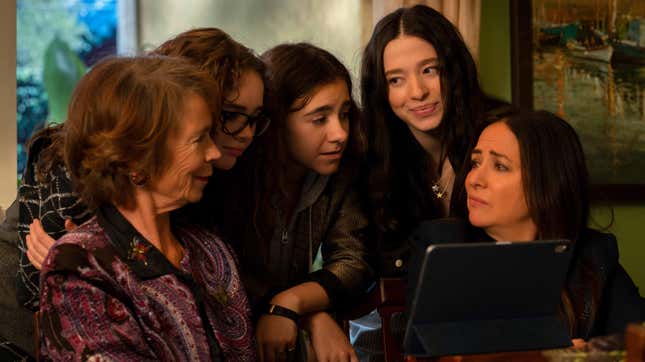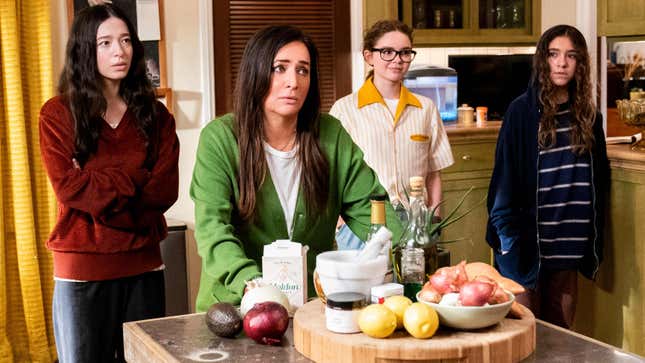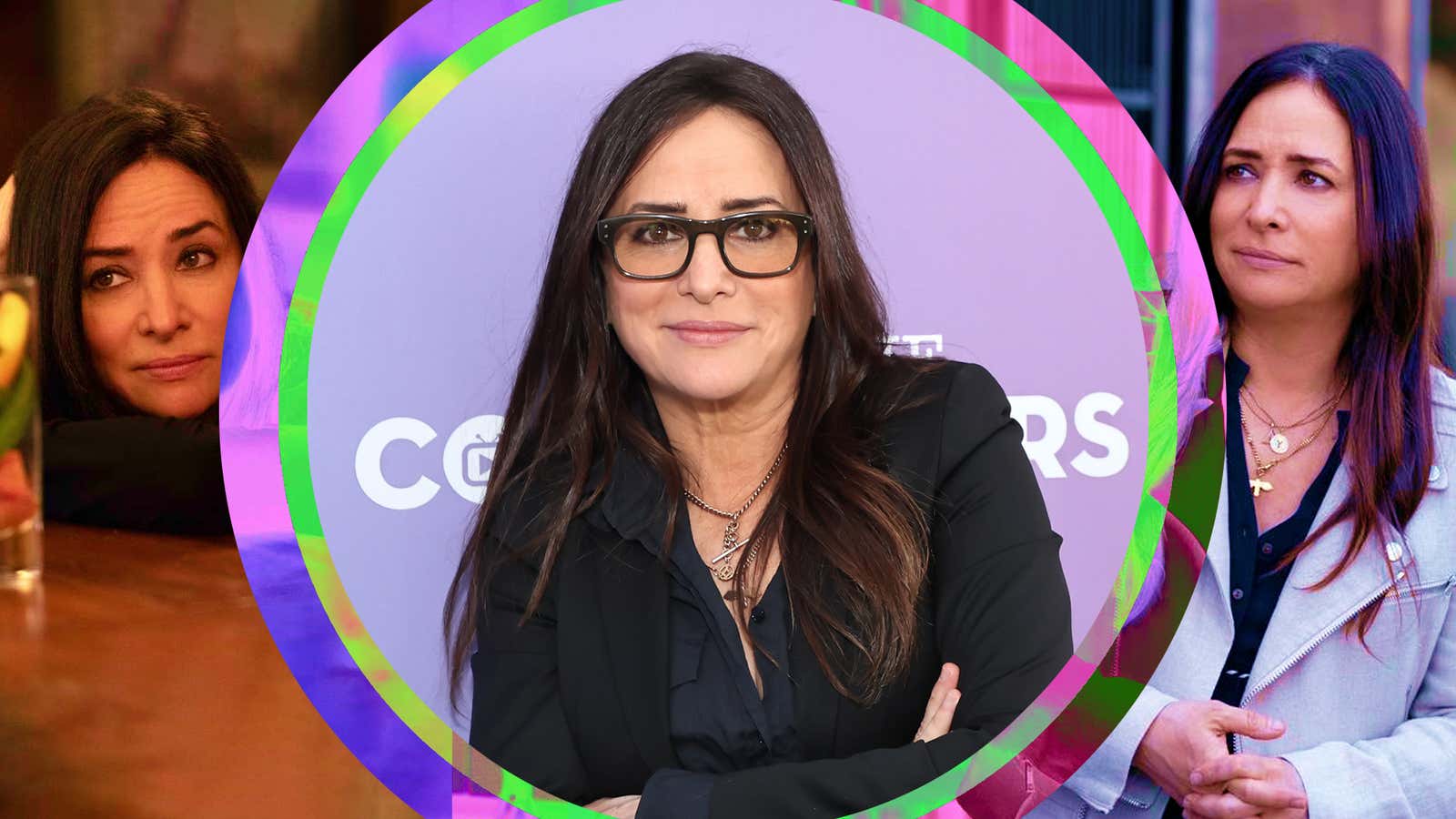Pamela Adlon has already accomplished a lot in TV, from her Emmy-winning voice work in King Of The Hill to her 80-episodes run on Californication. But her biggest feat (so far) is Better Things, the FX comedy based on her life as a single working mom that she co-created, wrote, directed, and starred in over five seasons.
In the series, Adlon plays Sam Fox, an actor raising her three daughters: Max (Mikey Madison), Frankie (Hannah Riley), and Duke (Olivia Edward). Much like Adlon in real life, Sam’s fam lives across the street from her British mother, Phyllis a.k.a. “Phil” (Celia Imrie). While the show is obviously highly specific and personal, Better Things is consistently evocative and relatable. With subtle, surreal depictions of family, motherhood, and friendships—all frenzied but ultimately nourishing relationships—Better Things, over time, became one of TV’s most powerful shows.
To toast Better Things’ series finale last night, April 25, The A.V. Club spoke to Adlon about the show’s musical goodbye, her favorite episodes, the challenges of distinguishing Sam from her real self, and how she managed to make all of the cooking scenes so enticing.
The A.V. Club: How did you land on the closing sequence of the finale, with everyone breaking the fourth wall to sing “Always Look On The Bright Side Of Life.” Why did you want to bookend season five with the Monty Python songs? It was so sweet, I wept.
Pamela Adlon: [Excitedly.] You cried?
AVC: Yes, it felt like the characters were pausing what they were doing and speaking to me directly in song.
PA: I love that. That makes me want to cry again. And call up my editor, Annie Eifrig. We both cried every time we watched that bit too, especially that one shot when the cast looks up, kisses goodbye, and shouts “I love you” at the end.
I knew I wanted to bookend this season with the two Eric Idle cues. I thought starting with “The Galaxy Song” in episode one with him singing “Whenever life gets you down, Mrs. Brown” was a great way to acknowledge the craziness of the world, and how messed up we all are in our heads getting back into it. And then I wanted to finish with “Always Look On The Bright Side Of Life,” because that’s my personal goodbye kiss to everyone who’s been with the show. We’ve had super fans from the beginning. It’s me doffing my hat to everybody watching and giving them all a hug. Everything is risky because I don’t know how [breaking the fourth wall] is going to come off. I don’t want to make people lose the feeling of being in the Better Things world, so we did it carefully. But I knew if I’m getting that roller-coaster feeling, then it will work within the show.
AVC: The story is left open-ended with every character. Nothing ends definitively. Would you ever want to revisit Better Things down the line?
PA: I would love to. One of the things I wanted to do, despite knowing it’s the final season, is still keep the world going. Sam is creeping on the blue house, and you understand why in the finale. It’s because that’s her childhood home. You meet the present owner of the house, played by John Ortiz, and then we meet him again as the park ranger when they reconnect. That’s something I hope audiences look at and wonder, “Oh, what’s going to happen between them, are they going to become friends?” I plant new seeds for the future, and I like that. I’ve ended every season as if it was the last one. Life keeps going, it’s not up to me, it’s just part of the way we’ve always told the story. It’s fun to think I could look at the world again down the line.
AVC: You said you always ended each season as if it was the last. What made you decide that the fifth would actually be it? How long did you envision you’d keep going when the show began in 2016?
PA: It was just a mutual decision with me and my network. Five seasons is incredible. I can’t believe I got to do them. I’m grateful. I love how we ended. I never had anything in mind when I began and couldn’t believe we got picked up after the pilot episode. Everything was a pleasant surprise after that. Also, for as many people who love the show right now, which is a select few groups, I know and hope the show will get discovered because it’s streaming on Hulu. It makes me happy to think about the people who are yet to find it.

AVC: What was it like to evolve the relationship between Sam’s three daughters over the years?
PA: Max, Frankie, and Duke are all such different people, like my own three kids, but I didn’t have a sister so it was interesting. One of my friends said to me a couple of years ago when I was trying to figure out part of their dynamic, she said, “You know you don’t have a sister.” It made me laugh. But my kids helped me cast the girls who play them, and then the actors helped flesh out their roles. Hannah was self-conscious, so she would do all these funny things and I had to tell her to stay in the moment. One day I just said to her, “You’re such a clown, like a real Buster Keaton type.” That’s when we ended up writing the clowning her character Frankie does in season four. So it was really about paying attention and building on the girls’ strengths or flaws.
AVC: The show is very specific because it’s authentically about your life. But for me, and for audiences whose lives couldn’t be more different, it was still easy to deeply relate to Better Things. How do you think you were able to achieve that?
PA: I really appreciate you saying that to me. It was really important for me to write a show and make these characters feel real. I wanted Better Things to be like an international show. Our world is bigger than just one thing. I didn’t want it to be one kind of an all-American single mom show. I wanted to write things that happened to me, but that resonates in a way that everybody can find something to relate to. That was part of the challenge because people feel comfortable when you’re put in one category, like, “I live in a masculine world or a feminine world,” or “I’m a mom,” etc. In terms of my life, my friendships, or the food we all eat, it’s all over the place. I wanted the show to reflect that.
AVC: Was it nerve-wracking to have your real-life and then on-screen character be this similar?
PA: The biggest challenge was making Sam Fox an actual character and not just be me, Pamela. It’s almost easier to play somebody different from you than to play somebody who is essentially an extended version of you. You can’t be self-conscious then. You have to be bold and move through to discover new things.
AVC: Do you have a favorite episode? Season two’s “Eulogy” remains a favorite.
PA: I love season two’s penultimate episode, “White Rock.” I also love season three’s “The Unknown,” when Sam does the play reading. I love all of our finales.

AVC: I’ve never felt hungrier than while watching Better Things. The food content—from grocery shopping to cooking to eating—is incredibly real. And it’s hard to make these seemingly ordinary scenes feel so compelling.
PA: I can tell you that what we do is we shoot the scene as needed and then I say, “Okay, now we’ve got to spend time really cooking.” Or we reverse engineer it and cook first so all the mess is already there, depending on how we film the scene. It adds an element of work for us, yes, but it’s important because I would’ve liked to have seen that if I was a viewer. I appreciated it while watching and asked, “That looks good, what are they making.” It has to have life. It can’t be lifeless or loveless food. You’ve got to see the steam coming off of it, the hands manipulating it, you’ve got to see the kids cook. Only then is it satisfying.
AVC: The conversations also flow very seamlessly to an extent they don’t even feel pre-written. How did you and the team approach the writing to make it feel so natural?
PA: For me, I want people on the show to talk like they do in real life. That’s a pet peeve of mine when I’m watching something if the writing sounds stiff or weird. Dialogue is everything. I could build whole scenes and stories around good dialogue and character moments. It’s far more important to me than the overall structure or engine. All that comes later.
I learned more about writing in the past two years than I have in my entire career. With the shutdown, my friend and I first adapted her memoir into a screenplay before I started the writers’ room for season five. Now people were all over a Zoom room. We really had to mesh these personalities together. Everybody has a different outlook and things they relate to, but it’s about trusting everyone. At the end of the day, the show has a singular voice. Achieving that was always the most important thing.
